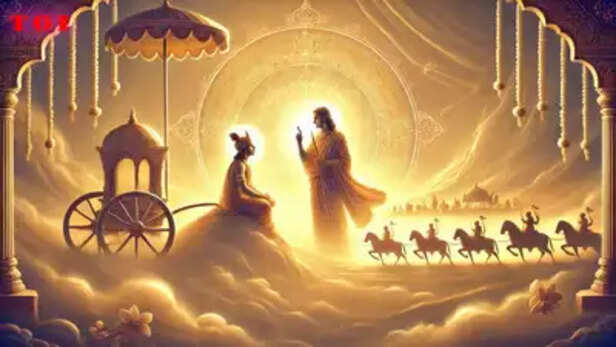Seeking Peace? These 10 Bhagavad Gita Shlokas Will Bring Tranquility to Your Soul!
Shristy sinha | Mar 27, 2025, 22:32 IST
कर्मण्येवाधिकारस्ते मा फलेषु कदाचन। मा कर्मफलहेतुर्भूर्मा ते सङ्गोऽस्त्वकर्मणि।।In this fast-pacing life, and hustle culture we all are losing our peace of mind. Amidst this, feeling relaxed and maintaining in your mental balance is getting really tough. You are also dealing frustration and stress, looking for peace. Here are 10 most powerful shlokas from Bhagavad Geeta that will bring you instant peace of mind and will help you to lead a balance life.
The Bhagavad Gita, a sacred dialogue between Lord Krishna and Arjuna, offers timeless wisdom for finding peace and harmony within oneself. The teachings from this divine text resonate deeply in today’s world, providing solace in moments of turmoil. Here are the Top 10 most powerful shlokas from the Bhagavad Gita that bring peace, ranked from 1 to 10. Each shloka has the potential to calm your mind and guide you towards true tranquility.

1. Shloka 2.47 – Karma Yoga (The Yoga of Action)
कर्मण्येवाधिकारस्ते मा फलेषु कदाचन।
मा कर्मफलहेतुर्भूर्मा ते सङ्गोऽस्त्वकर्मणि।।
(You have the right to perform your prescribed duties, but you are not entitled to the fruits of your actions. Never consider yourself to be the cause of the results of your activities, nor should you be attached to inaction.)
Explanation:
This shloka encourages selfless action and detachment from the outcome. It teaches us to focus on the process, not the result. By acting without attachment to rewards, one can experience peace and serenity. It reduces anxiety about the future and builds contentment in the present moment.
2. Shloka 18.66 – Surrender to God

सर्वधर्मान्परित्यज्य मामेकं शरणं व्रज।
अहं त्वाम् सर्वपापेभ्यो मोक्षयिष्यामि मा शुचः।।
(Abandon all varieties of dharma and simply surrender unto Me. I shall deliver you from all sinful reactions; do not fear.)
Explanation:
This shloka speaks of complete surrender to the divine will of God. It assures that by letting go of all worries and completely trusting in the Divine, one will attain peace and liberation. This act of surrender helps one to transcend fear and uncertainty, leading to tranquility.
3. Shloka 2.19 – The
य एनं वेत्ति हन्तारं यश्चैनं मन्यते हतम्।
उभौ तौ न विजानीतो नायं हन्ति न हन्यते।।
(He who thinks that the soul kills, and he who thinks of it as killed, are both ignorant. The soul kills not, nor is it killed.)
Explanation:
This shloka reveals the immortality of the soul, which is never born and never dies. Understanding the eternal nature of the soul can help remove the fear of death and bring inner peace. It teaches us to rise above the materialistic view of life and to focus on the eternal, tranquil nature of our being.
4. Shloka 9.22 – Divine Protection
अनन्याश्चिन्तयन्तो मां ये जना: पर्युपासते।
तेषां नित्याभियोगेन योगक्षेमं वहाम्यहम्।।
(To those who are constantly devoted and who always remember Me, I carry what they lack, and I preserve what they have.)
Explanation:
This shloka assures that when one dedicates themselves fully to God and is unwavering in their devotion, the Divine will provide and protect them. This message of divine assurance creates a sense of peace, knowing that we are not alone in our struggles.
यः सर्वत्रानभिस्नेहस्तत्त्रिप्तोऽत्मनात्मना।
योधि न द्वेष्टि न काङ्क्षे स शान्तिमधिगच्छति।।
(One who is not disturbed by the incessant flow of desires — who is free from longing, who is contented and mentally steady — can attain peace.)
Explanation:
This shloka defines the true yogi as someone who remains unaffected by desires, attachments, and worldly distractions. By practicing contentment and mental steadiness, one can experience peace that is unaffected by external circumstances.
6. Shloka 12.15 – The Path of Peace

य: सर्वत्रानभिस्नेहं व्यक्तिं च मानेन विहिंसते।
सर्वशक्ति महाशक्तिं मे अर्धम प्राप्नुयात्।।
(One who does not hate others, does not judge or harm them, and is free from ego, will gain peace.)
Explanation:
This verse emphasizes peace through non-violence, non-judgment, and humility. It teaches that by controlling one's mind, desires, and actions, one can maintain inner peace. It’s a reminder to cultivate love and kindness toward all beings.
7. Shloka 3.16 – Performing Duty without Attachment
एवं प्रवर्तितं चक्रं नानुवर्तयतीह य:।
अघायुरिन्द्रियारामो मोघं पार्थ स जीवति।।
(Arjuna, he who does not follow the wheel of creation set of going in this world (does not perform his duties), sinful and sensual, he lives in vain.)
Explanation:
This shloka emphasizes the importance of performing one’s duties (karma) in alignment with the divine order. By fulfilling our responsibilities selflessly, we contribute to the greater good and attain peace in our lives.
8. Shloka 18.63 – Freedom through Knowledge
इति ते ज्ञानमाख्यातं गुह्याद्गुह्यतरं मया।
विमृश्यैतदशेषेण यथेच्छसि तथा कुरु।।
(Thus, I have explained to you this knowledge that is more secret than all secrets. Ponder over it deeply and then do as you wish.)
Explanation:
This verse encourages reflection and introspection. By contemplating divine knowledge and acting according to one’s own understanding, peace is attained. It reminds us that inner peace comes from wisdom, and wisdom comes through contemplation and reflection.
9. Shloka 9.14 – The Nature of Devotees

नम: सर्वस्य च देवाय सर्वज्ञे सर्वात्मनि।
नित्यं शान्तं निराकारं योगिनं सबलस्य।।
(Salutations to the eternal, infinite, and peaceful divine consciousness, to which all beings are connected.)
Explanation:
This verse affirms that the Divine is the source of all peace. Surrendering to the eternal truth, one experiences peace that transcends material struggles and attachments. It teaches the power of connecting with the divine presence in all things.
10. Shloka 4.7 – Divine Incarnation for Restoration of Peace

यदा यदा हि धर्मस्य ग्लानिर्भवति भारत।
अभ्युत्थानमधर्मस्य तदात्मानं सृजाम्यहम्।।
(Whenever there is a decline in righteousness and an increase in unrighteousness, O Arjuna, at that time I manifest Myself on earth.)
Explanation:
This shloka reminds us that whenever there is chaos or imbalance in the world, the Divine intervenes to restore peace and harmony. By recognizing the Divine presence in our lives, we can trust that peace will always prevail over adversity.
The Bhagavad Gita provides a roadmap to achieve peace and tranquility amidst life's challenges. By internalizing these powerful shlokas, you can cultivate a calm, peaceful state of mind, detached from external outcomes, and deeply rooted in divine wisdom. These teachings guide you towards a life of serenity, free from fear and anxiety. Let these sacred verses fill your soul with the eternal peace that transcends all worldly distractions.
Explore the latest trends and tips in Health & Fitness, Travel, Life Hacks, Fashion & Beauty, and Relationships at Times Life!

A Girl Meditating
1. Shloka 2.47 – Karma Yoga (The Yoga of Action)
कर्मण्येवाधिकारस्ते मा फलेषु कदाचन।
मा कर्मफलहेतुर्भूर्मा ते सङ्गोऽस्त्वकर्मणि।।
(You have the right to perform your prescribed duties, but you are not entitled to the fruits of your actions. Never consider yourself to be the cause of the results of your activities, nor should you be attached to inaction.)
Explanation:
This shloka encourages selfless action and detachment from the outcome. It teaches us to focus on the process, not the result. By acting without attachment to rewards, one can experience peace and serenity. It reduces anxiety about the future and builds contentment in the present moment.
2. Shloka 18.66 – Surrender to God

A Girl Looking Towards the sky-praying to God
सर्वधर्मान्परित्यज्य मामेकं शरणं व्रज।
अहं त्वाम् सर्वपापेभ्यो मोक्षयिष्यामि मा शुचः।।
(Abandon all varieties of dharma and simply surrender unto Me. I shall deliver you from all sinful reactions; do not fear.)
Explanation:
This shloka speaks of complete surrender to the divine will of God. It assures that by letting go of all worries and completely trusting in the Divine, one will attain peace and liberation. This act of surrender helps one to transcend fear and uncertainty, leading to tranquility.
3. Shloka 2.19 – The Eternal Soul
य एनं वेत्ति हन्तारं यश्चैनं मन्यते हतम्।
उभौ तौ न विजानीतो नायं हन्ति न हन्यते।।
(He who thinks that the soul kills, and he who thinks of it as killed, are both ignorant. The soul kills not, nor is it killed.)
Explanation:
This shloka reveals the immortality of the soul, which is never born and never dies. Understanding the eternal nature of the soul can help remove the fear of death and bring inner peace. It teaches us to rise above the materialistic view of life and to focus on the eternal, tranquil nature of our being.
4. Shloka 9.22 – Divine Protection
अनन्याश्चिन्तयन्तो मां ये जना: पर्युपासते।
तेषां नित्याभियोगेन योगक्षेमं वहाम्यहम्।।
(To those who are constantly devoted and who always remember Me, I carry what they lack, and I preserve what they have.)
Explanation:
This shloka assures that when one dedicates themselves fully to God and is unwavering in their devotion, the Divine will provide and protect them. This message of divine assurance creates a sense of peace, knowing that we are not alone in our struggles.
5. Shloka 2.70 – The True Yogi
यः सर्वत्रानभिस्नेहस्तत्त्रिप्तोऽत्मनात्मना।
योधि न द्वेष्टि न काङ्क्षे स शान्तिमधिगच्छति।।
(One who is not disturbed by the incessant flow of desires — who is free from longing, who is contented and mentally steady — can attain peace.)
Explanation:
This shloka defines the true yogi as someone who remains unaffected by desires, attachments, and worldly distractions. By practicing contentment and mental steadiness, one can experience peace that is unaffected by external circumstances.
6. Shloka 12.15 – The Path of Peace

Path of Peace
य: सर्वत्रानभिस्नेहं व्यक्तिं च मानेन विहिंसते।
सर्वशक्ति महाशक्तिं मे अर्धम प्राप्नुयात्।।
(One who does not hate others, does not judge or harm them, and is free from ego, will gain peace.)
Explanation:
This verse emphasizes peace through non-violence, non-judgment, and humility. It teaches that by controlling one's mind, desires, and actions, one can maintain inner peace. It’s a reminder to cultivate love and kindness toward all beings.
7. Shloka 3.16 – Performing Duty without Attachment
एवं प्रवर्तितं चक्रं नानुवर्तयतीह य:।
अघायुरिन्द्रियारामो मोघं पार्थ स जीवति।।
(Arjuna, he who does not follow the wheel of creation set of going in this world (does not perform his duties), sinful and sensual, he lives in vain.)
Explanation:
This shloka emphasizes the importance of performing one’s duties (karma) in alignment with the divine order. By fulfilling our responsibilities selflessly, we contribute to the greater good and attain peace in our lives.
8. Shloka 18.63 – Freedom through Knowledge
इति ते ज्ञानमाख्यातं गुह्याद्गुह्यतरं मया।
विमृश्यैतदशेषेण यथेच्छसि तथा कुरु।।
(Thus, I have explained to you this knowledge that is more secret than all secrets. Ponder over it deeply and then do as you wish.)
Explanation:
This verse encourages reflection and introspection. By contemplating divine knowledge and acting according to one’s own understanding, peace is attained. It reminds us that inner peace comes from wisdom, and wisdom comes through contemplation and reflection.
9. Shloka 9.14 – The Nature of Devotees

God's Statue on a Leaf
नम: सर्वस्य च देवाय सर्वज्ञे सर्वात्मनि।
नित्यं शान्तं निराकारं योगिनं सबलस्य।।
(Salutations to the eternal, infinite, and peaceful divine consciousness, to which all beings are connected.)
Explanation:
This verse affirms that the Divine is the source of all peace. Surrendering to the eternal truth, one experiences peace that transcends material struggles and attachments. It teaches the power of connecting with the divine presence in all things.
10. Shloka 4.7 – Divine Incarnation for Restoration of Peace

Shri Krishna Giving lesson to Arjuna in Mahabharata
यदा यदा हि धर्मस्य ग्लानिर्भवति भारत।
अभ्युत्थानमधर्मस्य तदात्मानं सृजाम्यहम्।।
(Whenever there is a decline in righteousness and an increase in unrighteousness, O Arjuna, at that time I manifest Myself on earth.)
Explanation:
This shloka reminds us that whenever there is chaos or imbalance in the world, the Divine intervenes to restore peace and harmony. By recognizing the Divine presence in our lives, we can trust that peace will always prevail over adversity.
Explore the latest trends and tips in Health & Fitness, Travel, Life Hacks, Fashion & Beauty, and Relationships at Times Life!
Frequently Asked Questions ( FAQ's)
- What does the Bhagavad Gita say about peace?The Bhagavad Gita says true peace comes from self-realization, detachment, and surrender to the Divine.
- What is the importance of Geeta shlok?Gita shlokas provide timeless wisdom for righteous living, inner peace, and spiritual growth.
- How to get supreme peace according to Gita?Supreme peace is attained through devotion, selflessness, and surrender to Krishna.
- How to get supreme peace according to Gita?Always choose peace by controlling desires, practicing detachment, and embracing wisdom.
